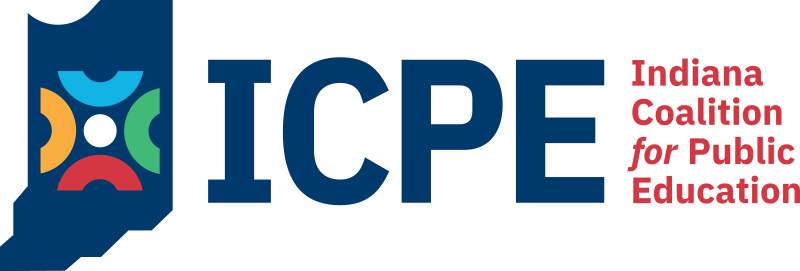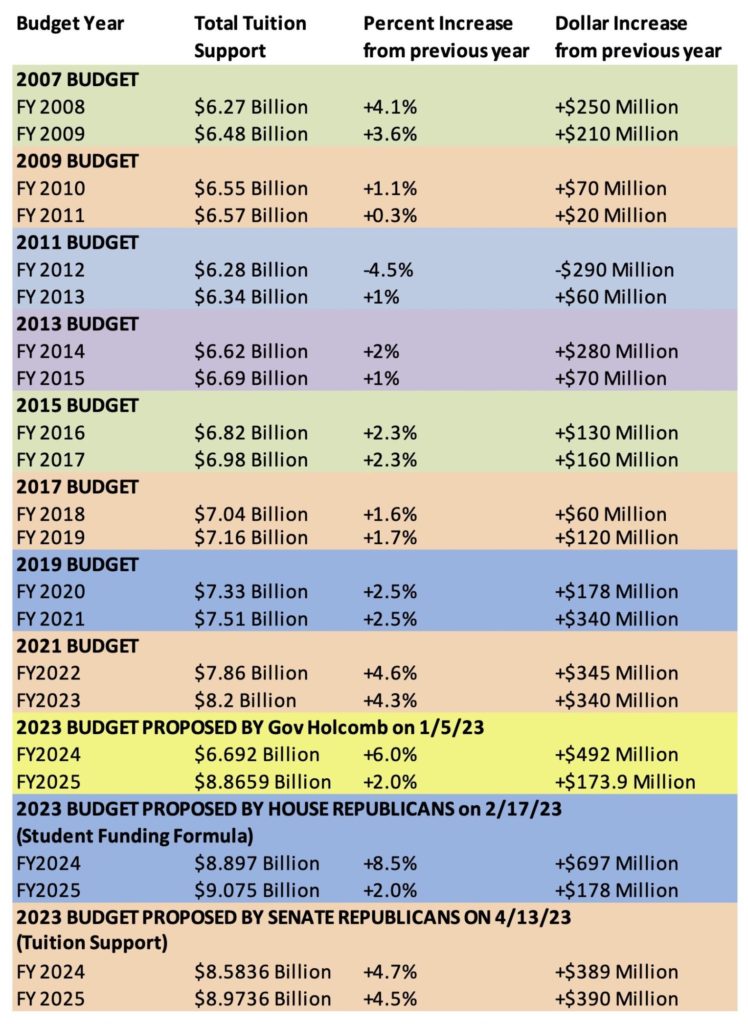Vic’s Statehouse Notes #374 – Education budget analysis

Dear Friends,
The Indiana Senate, led by Senate Appropriations Committee Chair Ryan Mishler, unveiled its proposed budget on April 13 and passed it on April 18, by a vote of 40-10.
The Senate budget is more favorable to public education than is the House budget on two crucial points:
- The enormous expansion of private school vouchers proposed by the House was taken out. Voucher eligibility pathways remain as in previous years. Income eligibility was not expanded to $220,000 for a family of four. It remains as before at $154,000. This is a strong move by the Senate to support public education.
- A $160 million fund each year was added to pay for student textbooks, called “Curricular Material Reimbursement,” The House plan was for school districts to pay for textbooks out of the general fund used to pay teacher salaries. The Senate plan does not force school districts to make a choice between paying for textbooks and raising teacher salaries.
Let Senators and Representatives know that you support these major changes because you strongly support our traditional public schools, the centers of our communities.
Private school voucher lobbyists are going all out to restore the extremely generous voucher expansion. Let legislators know that it just makes no sense to increase tax dollars going to high income private school parents when the tax payers footing the bill have absolutely no control or influence over private school programs. Tax payers control public schools when they elect school board members. Private schools have no such connection and no accountability to taxpayers.
The budget now goes to a conference committee with the House.
Time is short. Legislators expect a final revenue forecast yet this week. They must by law adjourn this session next week by April 29. Let your voice be heard this week.
You will notice three things when you study the comparison with recent budgets in the chart that follows:
- The Senate has evened the proposed increases in the first and second year of the budget: 4.7% in the first year and 4.5% in the second year. Both the Governor (6.0% and 2.0%) and the House (8.5% and 2.0%) had stark drops from year 1 to year 2. Both put the second year increase at 2%, clearly a problem when inflation is high. The Senate budget appears to be better able to help schools avoid a funding crisis in the second year.
- The chart that follows shows that the Senate budget for 2023 exceeds the highly acclaimed 2021 budget. In 2021, the increase in the first year was 4.6% and 4.3% in the second year. This 2023 plan is better than the 2021 plan that brought last-minute euphoria and bipartisan support because of its generosity.
- The historical record shows that 2021 was the best funding for K-12 since 1999 when the budget increased 4.7% in both the first and the second year of the budget. It should be remembered however that in that era, K-12 increases were funded with a combination of state money and local property tax. In 2021, the remarkable increases were all funded with state money. The same can be said about the proposed 2023 increases.
Two concerns about the Senate Budget
- Property tax could go to charter schools for the first time. This unwelcome plan to give property tax to eligible charter schools has a silver lining. If charter schools opt to participate in this program to receive property taxes, they must follow accountability guidelines and file transparency expenditure reports that charter schools have not ever before had to share with the public. Prior to this, charter schools only had to have their books audited by a private auditing firm.
- Career and Technical Education (CTE) grants have been removed from the Senate budget. The reasons are not clear. CTE program expenses would have to come from the general fund.
The chart below shows how three budget proposals stack up compared to the eight previous budgets:
1) the Governor’s budget plan announced January 5;
Keep these factors in mind for a fair comparison of the House and Senate budget proposals.
INDIANA SCHOOL FUNDING INCREASES FOR THE PAST EIGHT BUDGETS FOR COMPARISON WITH GOV. HOLCOMB’S BUDGET {JANUARY) AND THE HOUSE BUDGET (FEBRUARY)
Now it’s time to send messages to all legislators this week supporting the Senate budget’s removal of the mammoth increase for private schools vouchers. Also let them know you support a dedicated line item for student textbooks so that textbooks don’t become a tradeoff in teacher salary negotiations.
Vic’s Statehouse Notes and ICPE received one of three Excellence in Media Awards presented by Delta Kappa Gamma Society International, an organization of over 85,000 women educators in seventeen countries. The award was presented on July 30, 2014 during the Delta Kappa Gamma International Convention held in Indianapolis. Thank you Delta Kappa Gamma!
ICPE has worked since 2011 to promote public education in the Statehouse and oppose the privatization of schools. We need your membership to help support ICPE lobbying efforts. We need all ICPE members to renew their membership if you have not done so.
Our lobbyist, Joel Hand, represents ICPE extremely well. We need your memberships and your support to continue his work in 2023. We welcome additional members and additional donations. We need your help and the help of your colleagues who support public education! Please pass the word!
Visit ICPE’s website at www.indianacoalitionforpubliced.org for membership and renewal information and for full information on ICPE efforts on behalf of public education. Thanks!
Vic Smith is a lifelong Hoosier and began teaching in 1969, serving as a social studies teacher, curriculum developer, state research and evaluation consultant, state social studies consultant, district social studies supervisor, assistant principal, principal, educational association staff member, and adjunct university professor.
Vic received a Distinguished Alumni Award from the IU School of Education, he was named to the Teacher Education Hall of Fame by the Association for Teacher Education and received the 2018 Friend of Education Award from the Indiana State Teachers Association.

